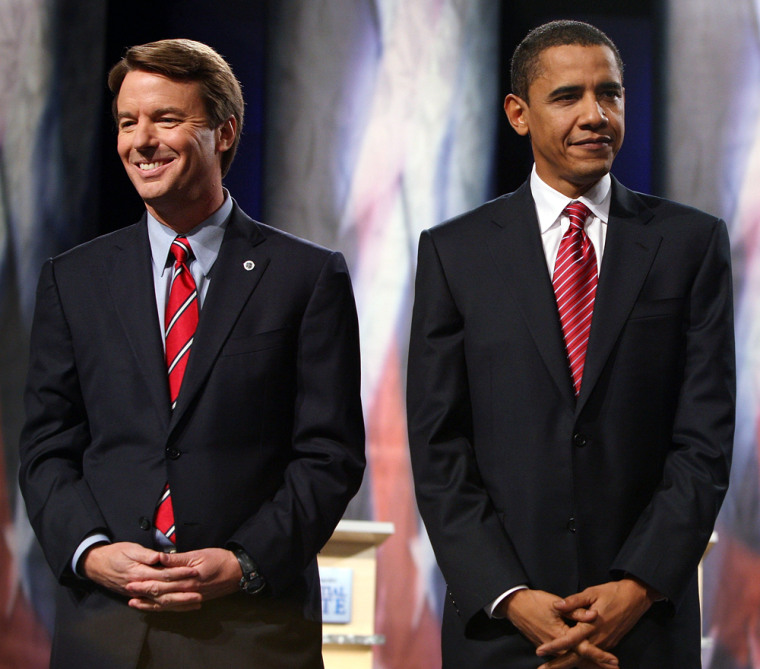As Democratic presidential contender John Edwards fielded questions from a crowd of about 100 people in Elkader, Iowa (population 1,374) Friday night, he got one of those out-of-left-field queries for which a candidate needs his sharpest wits.
An elderly man told Edwards that “something has been sticking in my craw” and explained that “a certain fella committed two murders in California and the jury found him not guilty. And all they said was, ‘It’s payback time.’ How are you going to have that come out in this election to combat one of your competitors?”
Edwards seemed puzzled, as most people in the audience seemed to be.
“The black jury in Los Angeles, the reason they found O.J. not guilty was ‘payback,’” the older gent explained.
“Payback for what?” Edwards asked.
For mistreatment by white America, the man said.
“What do you want the president to do about that?” Edwards asked.
“How are you going to get that brought out in your campaign? Will the same thing happen? If he should become elected, you think Al Sharpton, Jesse Jackson, Oprah Winfrey are going to let him forget about that and their obligation?” the man said, not identifying who he meant by “he” and “him.”
“I’m still not sure what it is that you’re asking,” Edwards said, a bit uneasily.
Voter questions O.J. verdict
“Obama,” the man said, “has never said anything about payback for the problems the blacks have had getting their foothold in society.”
It wasn’t exactly clear, but the man seemed to want Barack Obama to denounce the “not guilty” verdict in Simpson’s 1995 trial.
Where a presidential contender stood on O.J. had apparently become this voter’s litmus test. There was also the implication in his question that if you vote for Obama, you get Sharpton and Jackson in the bargain.
Edwards said to the man that he’d work to “create the kind of opportunities for African-Americans that all Americans are entitled to.”
Edwards noted that African-Americans have higher rates of poverty and are more likely to not have health insurance than whites. He added, “Instead of focusing on what happened with O.J., what I want to do is focus on what I see as the underlying causes of those things, poverty in America, lack of health care, lack of opportunity….”
This may have been just one old eccentric in a small town, but there is a racial subtext lingering in the minds of some voters in Iowa.
A way to overcome racism
Some Obama fans say they plan to support him in the Jan. 3 precinct caucuses partly to prove that America has overcome racism and that the White House is open to someone who is, as Obama describes himself, “a black guy born in Hawaii with a father from Kenya and a mother from Kansas.”
A few hours before Edwards handled that O.J. question in Elkader, he had a campaign event at a Manchester, Iowa, steakhouse.
Rita Domeyer, a retired farm wife from Dyersville, showed up to listen to him.
“I like Obama; I read his book and I think he had quite an upbringing, and he handled it very well,” Domeyer said, as she waited for Edwards to arrive on his campaign bus. “I’m not racist and I don’t like to hear anybody say, ‘Because he’s black he can’t win.’”
She added that she does believe that Obama can win and that his Kenya-Kansas parentage would not be a liability in an election. “But you hear a lot the other way; we’re pretty white around here, you know,” she said.
Iowa is indeed “pretty white.” According to exit poll interviews in 2004, only 1 percent of the state’s electorate was black. The Census Bureau reports that non-Hispanic whites make up 92 percent of Iowa’s population, while non-Hispanic whites make up 67 percent of the total American population.
Iowa Democrats are, by and large, too politically circumspect to say that they think it would be risky for the Democratic Party to nominate Obama because some voters would be racially prejudiced against him.
Some Iowans insist that race plays no role in their consideration of Obama: “Black or white, it makes zero difference today,” said Kevin Miller, a dairy farmer who went to hear Obama speak in Monticello, Iowa, on Friday.
When Obama, in effect, launched his presidential bid in Manchester, N.H., last December, he made a point of playing down the potential hazards of being a black (or mixed race) candidate in a country where four out of five voters are white.
Reflecting on the 2006 Senate election in Tennessee, Obama said, “I don’t think Harold Ford lost because of his race.”
Ford, an African-American, was the Democrat defeated by Republican Bob Corker.
“I thought that the Harold Ford election showed enormous progress. Something that hasn’t been noted is the fact that Harold Ford did better among white voters than the polls would have indicated,” Obama said.
When black candidates Doug Wilder and Tom Bradley ran for governor of Virginia in 1989 and California in 1982, respectively, polls predicted that each would get a higher share of white voters than they in fact won on Election Day.
Whether some Iowa voters on the night of the caucuses end up sheering off from Obama due to racial fears is a question that will probably never be answered in a definitive way.
